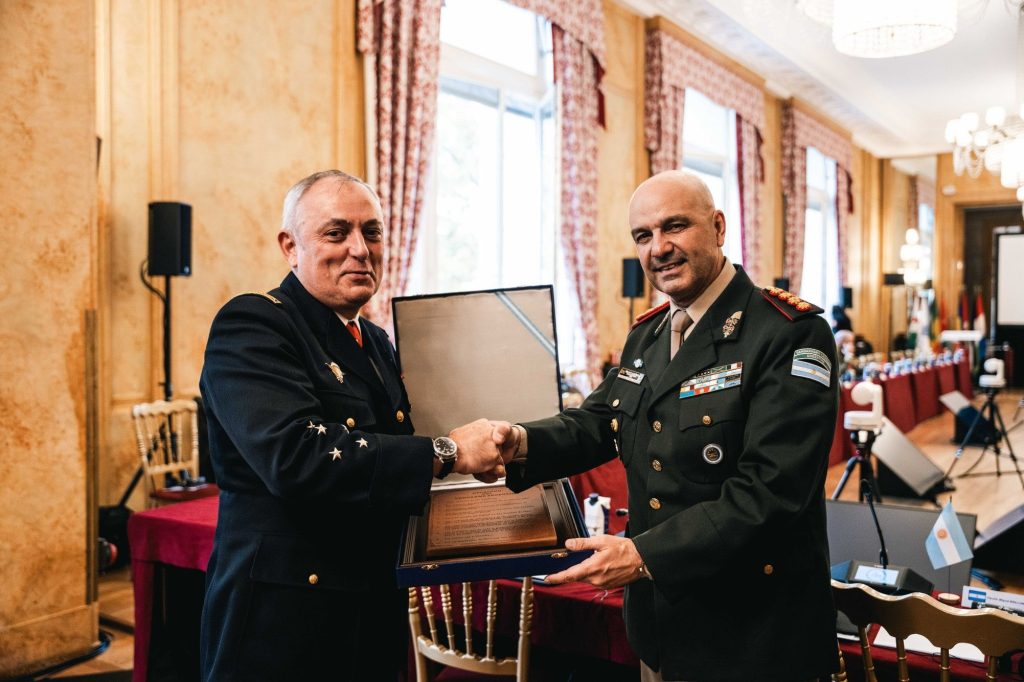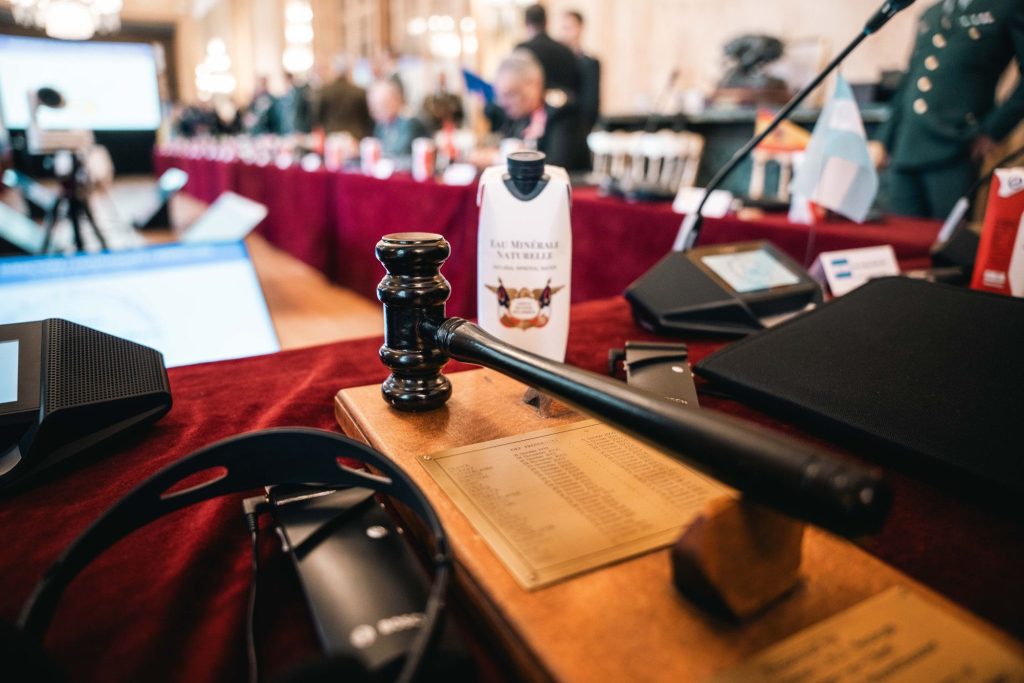The impact and challenges of artificial intelligence for Gendarmerie Type Forces
On the occasion of the 25th FIEP Summit, held on Tuesday, 21 October 2025, the presidency was transferred to the Argentine Gendarmerie. This change marks the end of the French cycle, devoted to the theme “Challenges and Impacts of Artificial Intelligence for Gendarmerie-Type Forces”, and the beginning of a new cycle.
On Tuesday, 21 October 2025, in the grand salon d’honneur of the Cercle National des Armées in the heart of the French capital, the twenty-three Directors General of gendarmerie-type internal security forces convened for the 25th High Council of Directors and General Commanders of FIEP, the international association of the world’s gendarmeries.
Before the official opening of the summit by the Director General of the French Gendarmerie, the Minister of the Interior, Laurent Nuñez, who was present for the event, praised the “considerable” and increasingly indispensable cooperation carried out in a “particularly tense geopolitical climate” by the twenty-three internal security forces of the FIEP member states. “The FIEP is not merely a forum for discussion; it is also a body resolutely engaged in action, being indeed the first worldwide to propose a shared vision regarding the use of artificial intelligence by internal security forces. This is a collective strength of which you may be justly proud,” he declared.
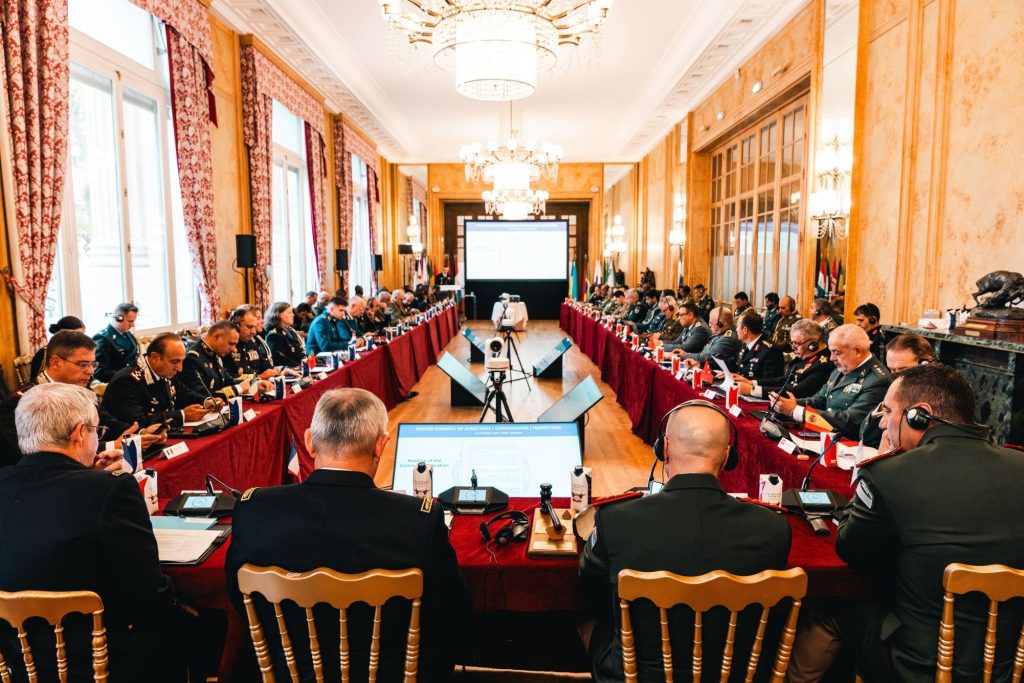
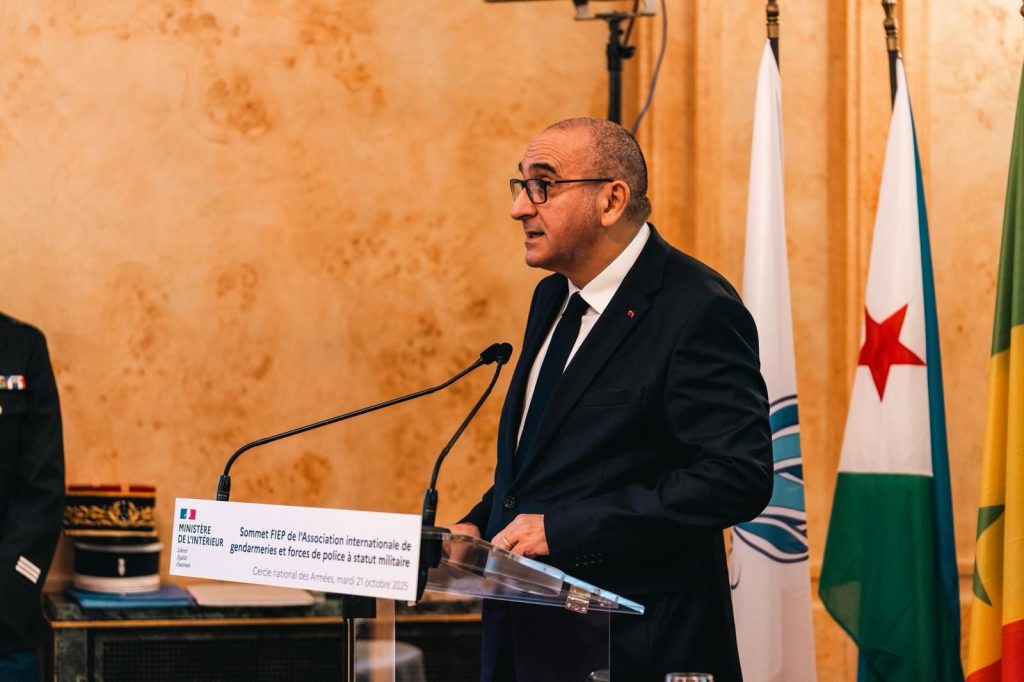
Amid applause from the Directors General, the Director General of the French Gendarmerie, General Hubert Bonneau, then took the floor to officially open the 25th High Council, striking the emblematic FIEP gavel, passed from one presidency to the next.
“Artificial intelligence at the service of security”
Throughout the day, several significant moments followed one another, the central point being the speeches delivered by twenty of the twenty-three Directors General present (the Director General of the French Gendarmerie having already spoken, and the two Directors General from newly admitted observer countries not yet being installed).
With a united voice and sincere conviction, each Director General stressed the need to further strengthen international cooperation in the face of increasingly structured, limitless, and borderless criminality. These views were notably reiterated by Lieutenant General Claudio Brilloni, Chief of the Argentine National Gendarmerie and incoming FIEP President: “The protection of our citizens constitutes the fundamental pillar of all police services with military status. In this regard, reinforcing our actions through training, police cooperation against organised crime, information exchange, coordination, and joint operations between the different forces represents the means for a more effective struggle, employing innovative and varied operational methods.”
One such innovative method was at the heart of the speeches: Artificial Intelligence (AI). As the principal theme of the French presidency, chosen by the French Gendarmerie at the Rome Summit in October 2024, AI shaped exchanges throughout the year under the overarching theme: “Challenges and Impacts of Artificial Intelligence for Gendarmerie-Type Forces.”
To structure these discussions, the debates were organised around four commissions: Human Resources, International Affairs, New Artificial Intelligence Technologies, and the Use of AI in Service Organisation.
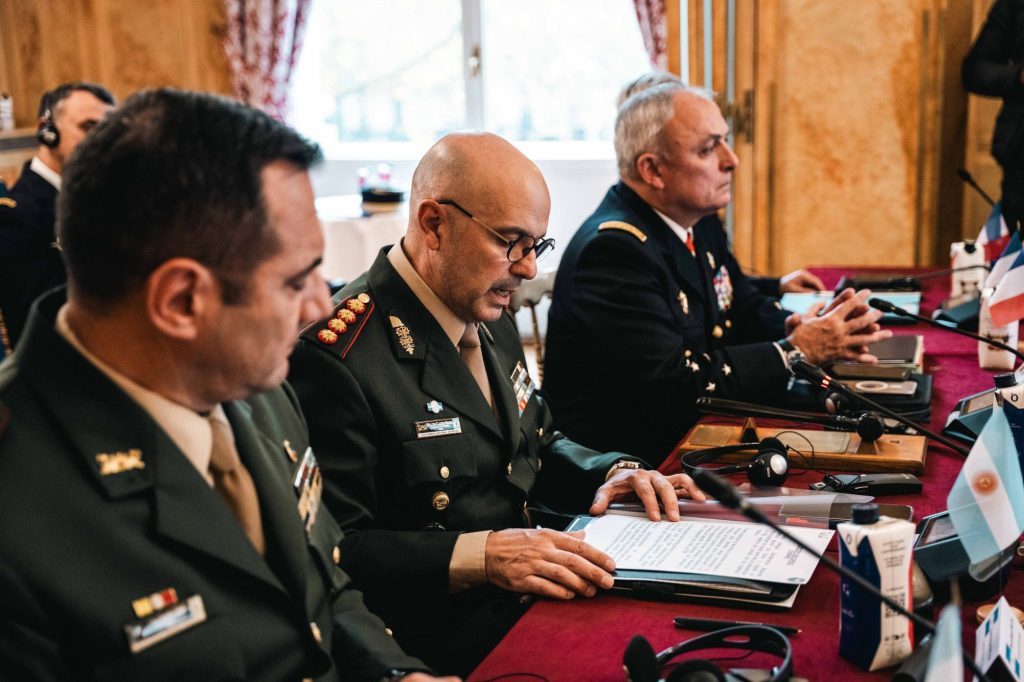
These commissions were highlighted by General Patrick Perrot, expert chair of the French presidency, Doctor of Artificial Intelligence, and specialist in AI governance and cybersecurity, during his assessment: “The work conducted within the commissions has traced a clear path: that of artificial intelligence at the service of security, framed by balanced regulation, underpinned by human oversight, and guided by responsibility. Our collective ambition must now be to anchor this dynamic sustainably in the daily practice of our forces, making it a lever for sovereignty and operational effectiveness. Artificial intelligence will never replace the actions of the men and women who comprise our forces, but it can multiply their capacities and strengthen our institutions—both in combating crime and asserting sovereignty.”
To embody the various lines of thought developed within these commissions, several FIEP experts, coordinated by General Perrot and assisted by Ms Ysens de France, AI specialist within the Transformation Service of the DGGN, worked for more than six months to produce two deliverables: the first, a synthesis of the work conducted by the four commissions; the second, a guide to best practices for responsible, regulated use of artificial intelligence by security forces. “These are two concrete tools intended to guide our forces towards a reasoned and determined adoption of artificial intelligence dedicated to combating crime,” General Perrot explained.
As the summit’s culminating moment, following the presentation of these deliverables, the twenty-three Directors General were invited to sign the joint declaration treaty, confirming the adherence of all FIEP members to the AI best-practices guide—a first at the international level, as Ms Ysens de France reminded the audience during her address.
The FIEP, the association of the world’s gendarmeries, comprises twenty-three countries: the four founding members from which it draws its name—France, Italy, Spain, and Portugal—and nineteen additional states: Turkey, the Netherlands, Morocco, Romania, Argentina, Chile, Jordan, Qatar, Tunisia, Brazil, Palestine, Ukraine, Djibouti, Senegal, Kuwait, San Marino, Moldova, and, newly admitted as observer members, Congo-Brazzaville and the United Arab Emirates.
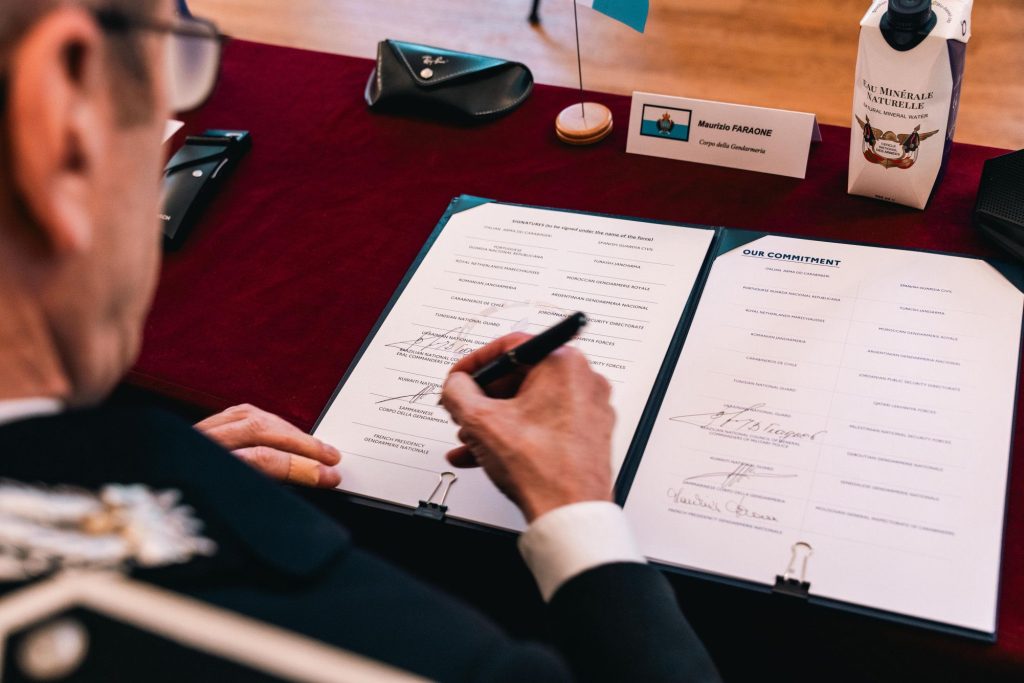
New presidency, new shared theme of reflection
Following the signature of the joint declaration, the Director General of the French Gendarmerie carried out his final act as FIEP President by inducting two new forces: the National Gendarmerie of the Republic of the Congo (Congo-Brazzaville) and the National Guard of the United Arab Emirates. For one year, both will hold observer status before becoming full members at the 2026 summit. “It is with pride that we welcome you as observers for a period of one year, at the end of which you will become full members. On behalf of all members of our organisation, I extend to you my sincere congratulations, and now successively give you the floor,” declared General Hubert Bonneau following the installation of the two new flags.
The time then came for the transfer of the presidency. “This FIEP presidency has been for us—for the French Gendarmerie—a significant and rewarding undertaking, an honour and a source of pride. Last year, we hosted the Olympic and Paralympic Games; this year, we have hosted the FIEP. The moment has come to pass the torch to our Argentine colleagues for the coming year. It is with great emotion that I now turn to our colleague from the Gendarmería Nacional Argentina. Dear Lieutenant General Claudio Miguel Brilloni, it is your turn to assume the presidency of the FIEP. I know how strongly committed you already are to ensuring that the 2026 edition will be a genuine success. And so it will be, without a doubt! Les deseo lo mejor a nuestros compañeros argentinos para la próxima presidencia. ¡Vos sos Gardel!” concluded General Bonneau, symbolically passing the presidential gavel to the Argentine Director General.
For this new year and new cycle, the Argentine National Gendarmerie will lead discussions around a new theme: “The Protection of Strategic Objectives: A Shared Challenge for Gendarmerie-Type Forces.” This topic will once again be examined within the framework of the FIEP’s four commissions. These meetings will provide the forces of the twenty-three FIEP countries with new avenues for reflection, enabling the world’s gendarmerie forces to more effectively anticipate the challenges of tomorrow.
Parallel to the events of Tuesday, 21 October, the Directors General of the twenty-three FIEP member forces continued exchanges over two additional days through bilateral and multilateral discussions aimed at developing new areas of cooperation and strengthening those already in place—an opportunity for dialogue unique in its scope for Directors General representing such a diversity of national security forces.
